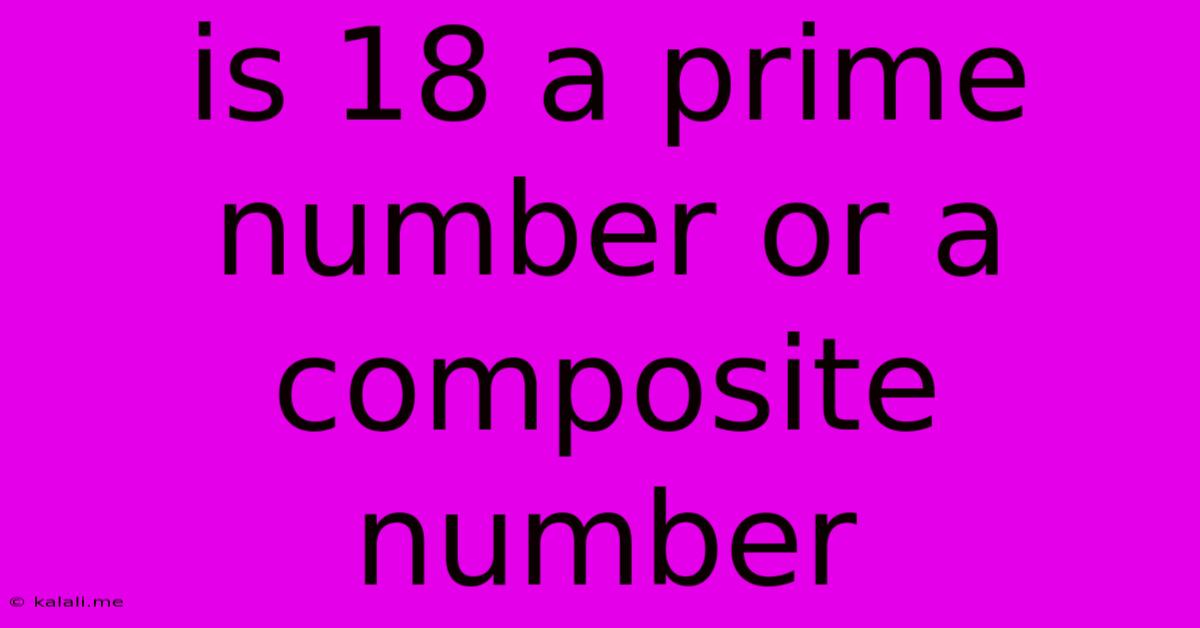Is 18 A Prime Number Or A Composite Number
Kalali
May 10, 2025 · 3 min read

Table of Contents
Is 18 a Prime Number or a Composite Number? A Comprehensive Explanation
Is 18 a prime number or a composite number? This seemingly simple question delves into the fundamental concepts of number theory. Understanding the difference between prime and composite numbers is crucial for various mathematical applications. This article will definitively answer the question and explore the concepts of prime and composite numbers in detail.
What are Prime Numbers?
Prime numbers are whole numbers greater than 1 that have only two divisors: 1 and themselves. This means they are only divisible without a remainder by 1 and themselves. Examples of prime numbers include 2, 3, 5, 7, 11, and so on. Prime numbers are the building blocks of all other whole numbers, a concept fundamental to number theory and cryptography.
What are Composite Numbers?
Composite numbers are whole numbers greater than 1 that have more than two divisors. In other words, they are divisible by at least one number other than 1 and themselves. For example, 4 (divisible by 1, 2, and 4), 6 (divisible by 1, 2, 3, and 6), and 9 (divisible by 1, 3, and 9) are all composite numbers.
Determining if 18 is Prime or Composite
Now, let's analyze the number 18. To determine if 18 is prime or composite, we need to find its divisors. Besides 1 and 18, 18 is divisible by 2, 3, 6, and 9. Since 18 has more than two divisors, it satisfies the definition of a composite number.
Therefore, the answer to the question "Is 18 a prime number or a composite number?" is definitively: 18 is a composite number.
Understanding Divisibility Rules
Identifying prime and composite numbers becomes easier with divisibility rules. For example:
- Divisibility by 2: A number is divisible by 2 if it's an even number (ends in 0, 2, 4, 6, or 8).
- Divisibility by 3: A number is divisible by 3 if the sum of its digits is divisible by 3. (1 + 8 = 9, which is divisible by 3, therefore 18 is divisible by 3).
- Divisibility by 5: A number is divisible by 5 if it ends in 0 or 5.
- Divisibility by 9: A number is divisible by 9 if the sum of its digits is divisible by 9. (1 + 8 = 9, which is divisible by 9, therefore 18 is divisible by 9).
By applying these rules, you can quickly determine potential divisors and thus, whether a number is prime or composite.
The Importance of Prime and Composite Numbers
The distinction between prime and composite numbers is not merely an academic exercise. Prime numbers are fundamental to:
- Cryptography: Many modern encryption methods rely heavily on the properties of prime numbers.
- Number Theory: Prime numbers form the basis for numerous theorems and concepts in advanced mathematics.
- Computer Science: Prime numbers play a role in algorithm design and optimization.
Understanding the concepts of prime and composite numbers provides a foundational understanding of number theory and its applications in various fields. Therefore, mastering this concept is essential for anyone interested in mathematics and computer science.
Latest Posts
Latest Posts
-
How Many Grams Of Sugar In A Pound
Jul 12, 2025
-
7am To 11am Is How Many Hours
Jul 12, 2025
-
If Your 35 What Year Was You Born
Jul 12, 2025
-
How Many Cups Is 1 Pound Of Cheese
Jul 12, 2025
-
30 X 30 Is How Many Square Feet
Jul 12, 2025
Related Post
Thank you for visiting our website which covers about Is 18 A Prime Number Or A Composite Number . We hope the information provided has been useful to you. Feel free to contact us if you have any questions or need further assistance. See you next time and don't miss to bookmark.